Engaging with the science behind food
The preparation of food is biochemically complex. At North Carolina Agricultural and Technical State University in the US, Dr Salam A. Ibrahim has established the Food Microbiology and Biotechnology Lab. Here, researchers and students collaborate with the food industry to address real-world challenges in food production and safety by uncovering the secrets of food microbiology. By providing students with opportunities to learn about and participate in food science research, the lab is also inspiring the next generation of food scientists.
Talk like a food microbiologist
Antimicrobial — something that kills or inhibits microorganisms
Bifidobacteria — a group of probiotic bacteria that live in the gut
Buffering capacity — the ability of a substance to resist changes to its pH
Fermentation — the chemical breakdown of a substance, often by bacteria or yeast
Growth medium — the substance on which bacteria are grown in a lab
Lactic acid bacteria — a diverse array of bacteria that ferment carbohydrates to produce lactic acid
Probiotic — a microorganism that stimulates the growth of beneficial gut bacteria
Eating is typically an enjoyable part of daily life. However, most people are probably unaware of the biochemical complexity of food and of what is involved in getting food safely from the farm to the table. In the Food Microbiology and Biotechnology Lab at North Carolina Agricultural and Technical State University (NC A&T), Dr Salam A. Ibrahim and his team explore these processes in depth, while cultivating a fascination with food from a scientific standpoint.
The lab is using state-of-the-art technology to improve the quality and safety of food products. Dr Ibrahim and his team collaborate with food industry professionals to learn about challenges they are facing and to develop innovative solutions to solve them. Then, they share their discoveries to educate the public and the next generation of food scientists. “Our strategy is based on the novel application of creative thinking and collaboration to achieve extraordinary outcomes,” explains Dr Ibrahim. This process of discovery, education and outreach is key to the lab’s many successes.
Discovery: exploring the benefits of bacteria
A key focus of the lab’s research is understanding the role of bacteria in food. While bacteria commonly get bad press for causing illnesses, the human gut is home to millions of bacteria that are actively helping us. Dr Ibrahim and the team are studying how ‘bad’ bacteria damage food and cause safety concerns, and how ‘good’ bacteria improve human health.
Dairy products are a common source of probiotic cultures (microorganisms that keep the gut healthy) so Dr Ibrahim’s team is exploring how these beneficial bacteria could be artificially added to other food products. “We’ve been trying to isolate strains of bifidobacteria and lactic acid bacteria, probiotics that could improve human health, food quality and food safety,” explains Dr Ibrahim. “We’re also investigating new methods to improve the function of probiotic supplements.”
Probiotic bacteria have a range of health benefits, such as aiding digestion, protecting against infections, and even fighting cancer. “Recently, we started working with Lactobacillus bulgaricus, a key bacterium in yoghurt production,” says Dr Ibrahim. “We’re interested in developing practical methods to produce this probiotic strain at the commercial scale.”
Education: inspiring the next generation of food scientists
Students studying food science at NC A&T benefit from the Food Microbiology and Biotechnology Lab in many ways. Not only does Dr Ibrahim use the results of his research when teaching classes about food microbiology and food safety, but students can also work in the lab to gain experience conducting their own food science research projects.
“When I first joined the lab, I helped graduate students with their research by creating bacterial growth media and growing bacteria for their experiments,” says Alaina Brock. “Now, I conduct my own research projects, focusing on using bacterial enzymes to discover new antimicrobials.” Thanks to his research experiences in the lab, Philip Junior Yeboah has gained skills in microbiology, fermentation, food safety and food product development. “I’ve participated in numerous research activities, including determining the buffering capacity of different coffee samples, perfecting the optimal growth medium for bacteria, and developing sweet potato energy bars to take advantage of the abundance of sweet potatoes grown in North Carolina,” he says.
Reference
https://doi.org/10.33424/FUTURUM420
Dr Ibrahim is keen to provide his students with experiences that enrich their education and prepare them for future careers in food science. “Our students have opportunities to work closely with the food industry, and to design research projects based on industry needs,” he says. Guest speakers from local food companies and federal agencies, such as the US Department of Agriculture (USDA) and Food and Drug Administration (FDA), share their expertise with students, and students participate in field trips to contextualise their classroom learning in industry settings. Thanks to the unique multidisciplinary approach among research, teaching and outreach, Dr Ibrahim was also able to establish the Food Science and Technology Endowment Fund to provide financial support for students studying food and nutritional science degrees at NC A&T.
Outreach: connecting research with the real world
“To be relevant, research depends upon understanding the needs of the industry and the wider world,” says Dr Ibrahim. “I am interested in working with the food industry to provide solutions to real-world challenges.” To this end, the lab hosts unique partnerships with food companies and farmers. “Most of our research is a collaboration between the food industry, consumers and our research team,” says Philip. “It is this collective approach that most often leads to breakthroughs.”
Outreach is a two-way conversation. Food companies and farmers indicate the knowledge gaps in the food industry that need to be filled. In return, the Food Microbiology and Biotechnology Lab fills these gaps through rigorous scientific research. “The food industry continues to look for new ideas that have practical applications and low costs,” explains Dr Ibrahim. “For example, the industry wanted to improve lactic acid bacteria growth to provide health benefits while using low-cost raw materials. We developed new approaches that have improved health benefits and reduced costs.” The lab has completed many successful research projects that are now having a positive impact on the food industry. For example, the team developed a growth medium that enhances production of bacterial cells and discovered how lactic acid bacteria produce natural antimicrobial compounds.
In addition to conducting research, students in the lab also participate in outreach activities to educate the public about food science and food safety. “On one occasion, we welcomed a class of high school students to the lab and gave them a tour of the facilities,” recounts Alaina. “My favourite part of this activity was showing students how to measure the pH of different foods, and explaining what this means for their application in food products.”
The team’s research is also shared with local food producers and consumers. “We help train local farmers on issues related to food handling and safety,” says Dr Ibrahim. “We support them in developing laboratory procedures to test their products and provide practical training workshops.”
The lab also runs a stall at the local farmers’ market to provide information and interactive demonstrations about food safety for vendors and customers. “We demonstrate the importance of food preservation techniques, proper food handling practices and the nutritional benefits of various foods,” says Philip. “A farmers’ market is a dynamic, community-driven environment. By using our food science knowledge, we contribute to the market’s success while empowering consumers and fostering a deeper appreciation for the science behind the food we eat.”
Through this unique combination of discovery, education and outreach, the Food Microbiology and Biotechnology Lab is contributing to healthier, tastier and safer food by supporting the food industry and inspiring the next generation of food scientists.
 Dr Salam A. Ibrahim
Dr Salam A. Ibrahim
Food Microbiology and Biotechnology Lab, College of Agricultural and Environmental Sciences, North Carolina Agricultural and Technical State University, USA
Fields of research: Food Microbiology, Food Biotechnology, Dairy Food Technology
Research project: The Food Microbiology and Biotechnology Lab – combining discovery, education and outreach of food microbiology, safety and innovation
Funders: US Department of Agriculture National Institute of Food and Agriculture (USDA-NIFA), Department of Homeland Security (DHS). This research was funded by a NIFA Evans-Allen grant (no. NC.X-267-5-12-170-1) and a NIFA capacity grant (no. 2022-38821-37351).
About food microbiology
Food microbiology is the subfield of food science that studies the microorganisms involved in food. While some of these contaminate food, others are essential for its production. For example, although fluffy fungi and slimy moulds destroy foods and make them unsafe to eat, yoghurt production relies on Lactobacillus bulgaricus to ferment milk, and bread rises thanks to yeast fermentation.
Food safety is a key aspect of food science, relying on good hygiene and proper food preparation and storage. While food microbiologists are studying microorganisms to explore how to prevent them contaminating food, the easiest step to food safety is keeping everything clean – wash your hands before and after preparing food and eating, and keep all utensils clean.
Why study food science?
“Studying food science allows you to understand food scientifically,” says Philip. “You will learn about food composition, preservation and the impact of processing techniques at a scientific level.” And with so many areas within the field, there is a wealth of opportunities to tailor your studies and future career in whatever direction matches your interests. Do you enjoy cooking, experimenting with flavours and tasting new foods? Are you interested in understanding how the chemical compounds in different foods influence human health? Would you like a career in food safety, such as performing quality control while monitoring food production lines? Studying food science will open many doors for you. “Our students have a wide range of opportunities ahead of them,” says Dr Ibrahim. “These include jobs with the food and food services industries, as well as careers in academia and government.”
Dr Ibrahim is also passionate about the importance of interdisciplinarity within the Food Microbiology and Biotechnology Lab. “Every scientific discipline, from biology and chemistry to engineering and economics, contributes to our success in a different way,” he says. “Food science, food safety and microbiology are all distinct, but related, interdisciplinary subject areas. The field of food science relies on leveraging knowledge from different disciplines alongside technological resources to enrich the research and learning process.”
Pathway from school to food microbiology
• If your school offers classes in food science or food technology, take these to learn the basics of the science behind food.
• Dr Ibrahim also recommends studying biology, chemistry and mathematics to learn about microorganisms, chemical reactions and statistical analysis.
• At university, degrees in food science, food microbiology or related subjects (such as food technology or food and nutrition) could lead to a career in food microbiology.
Explore careers in food microbiology
• “There are many career paths in food microbiology, ranging from microbiology research and food engineering to food safety, quality assurance and product development,” says Philip. “Careers in the sector are highly meaningful, as the world faces significant food security challenges. Jobs often combine scientific principles with practical applications, allowing the development of safe, nutritious and sustainable food while addressing global issues.”
• “Everybody has to eat!” says Alaina. “This highlights the importance of food science and means the number of jobs available in the field, especially in food microbiology and food safety, is continuously increasing.”
• Dr Ibrahim recommends joining the American Chemical Society, which provides opportunities for high school students, such as chemistry clubs, competitions, magazines and summer schools: www.acs.org/education/students.html
• Dr Ibrahim also recommends exploring the American Society for Microbiology, which provides a wealth of career resources for students: www.asm.org/Careers/Career-Planning
• Additionally, the Institute of Food Technologists (www.ift.org) and American Dairy Science Association (www.adsa.org) have resources specific to their respective sectors.
Meet members of the Food Microbiology and Biotechnology Lab

Alaina Brock
Undergraduate Research Scholar
I have always loved cooking – I used to bake cakes with my late grandmother and father. I began considering food science as a career after watching a TED Talk, ‘The Chemistry of Cookies’, by Stephanie Warren, that described bakers as mad scientists! The talk gave me a taste of the cool chemical reactions that occur in foods to create our favourite flavours.
After graduating, I hope to pursue a PhD in food science then work for a consumer products company developing snack foods. I believe that snacks should be both delicious and healthy, and I would love the opportunity to work with some of the brands that are cherished around the world.
My favourite concept within food science is the process behind Maillard reactions. These reactions happen when amino acids and sugars are exposed to heat, resulting in a variety of new molecules forming. It is these molecules that are responsible for all the wonderful tastes and aromas that we find in browned food, such as cookies, caramel and baked chicken.
To me, food science is a continuous source of interest as I love experimenting with new flavours and textures. It’s also always fun to taste your work! I enjoy working in the Food Microbiology and Biotechnology Lab because it gives me the opportunity to gain relevant work experience in how to conduct scientific research, and I have met many researchers, students and mentors who have enriched my studies.
I received a fair few rejections when applying for opportunities in food science, but I didn’t let this discourage me. If you are passionate about something, continue to put yourself out there and you will find your niche!
Alaina’s top tips
1. Seek opportunities outside the classroom, such as work experience with food businesses, that will expose you to the basics of the food industry.
2. Consider which areas within food science most interest you, such as food microbiology, chemistry or safety.
3. Find connections with people who can support and mentor you through your studies and career, such as industry professionals and academic researchers. Such connections can provide you with valuable opportunities and advice.

Philip Junior Yeboah
Graduate Research Assistant
I have always had a passion for food, and I enjoy experimenting with ingredients and exploring different cuisines. I grew up in a farming household and developed a deep appreciation for the importance of food and its impact on society. My father’s commitment to delivering high-quality products inspired me to learn about the principles of food safety.
I was intrigued by the scientific processes involved in transforming raw agricultural produce into food products. This fascination, combined with an interest in how food influences human health, motivated me to study food science. I have developed a passion for understanding the science behind food production, preservation and development, as well the importance of developing healthier food options to address health issues.
The field of food microbiology and biotechnology is constantly evolving. I enjoy working in the Food Microbiology and Biotechnology Lab because I have the opportunity to explore the intersection of food and science, including the microbiological aspects of food and how biotechnology can be applied to improve food safety, quality and production. As a student, it is satisfying to make significant contributions to ensuring food safety alongside my studies.
After achieving my master’s degree, I hope to undertake a PhD in food science. Beyond that, I aspire to work in food science research, quality assurance or product development. I would like to develop new food products, improve the quality of existing ones and explore innovative food technologies. I also dream of starting my own food-related business. With a solid understanding of food science principles, I can innovate and develop unique food products, launch a food manufacturing company, or establish a consulting firm providing expertise to the food industry.
Philip’s top tips
1. Seek practical experience through internships, research placements or volunteer opportunities in food-related industries. This will expose you to the real world of food science and provide valuable networking opportunities.
2. Pursue leadership roles and engage in related extracurricular activities. These will develop your teamwork, communication and organisational skills, while demonstrating your commitment and passion for the field.
3. Seek mentorship. Find mentors who can provide guidance, support and advice throughout your academic and professional journey.
Do you have a question for Dr Ibrahim, Alaina or Philip?
Write it in the comments box below and Dr Ibrahim, Alaina or Philip will get back to you. (Remember, researchers are very busy people, so you may have to wait a few days.)

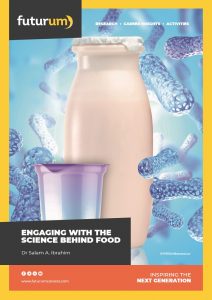
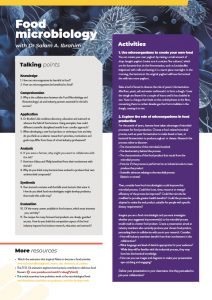
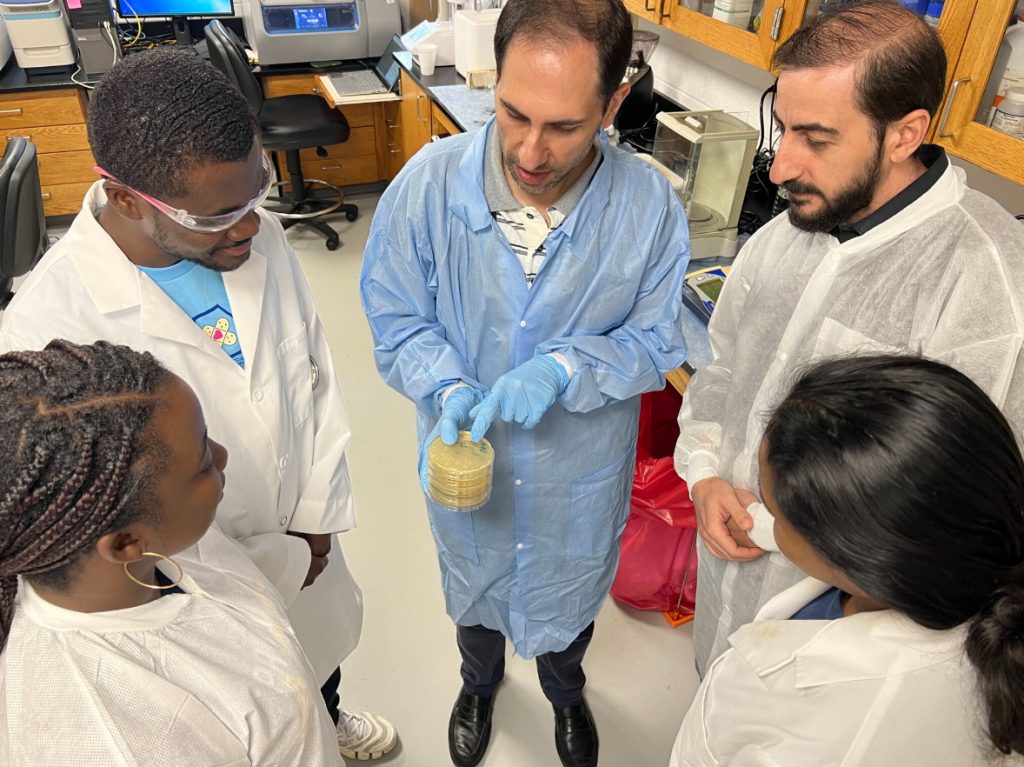
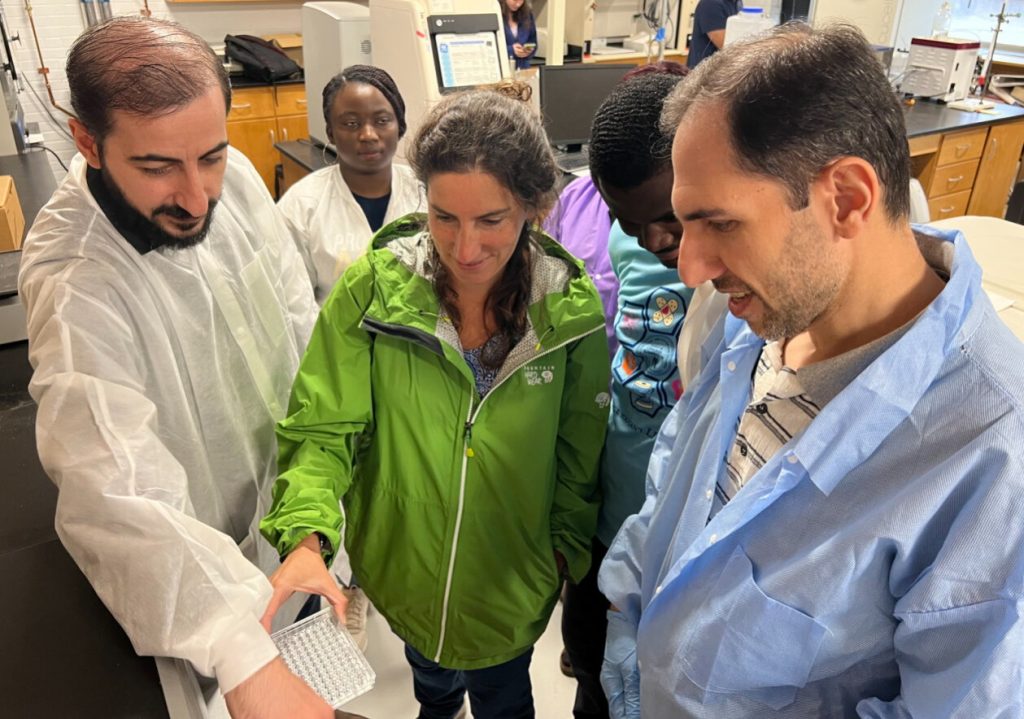

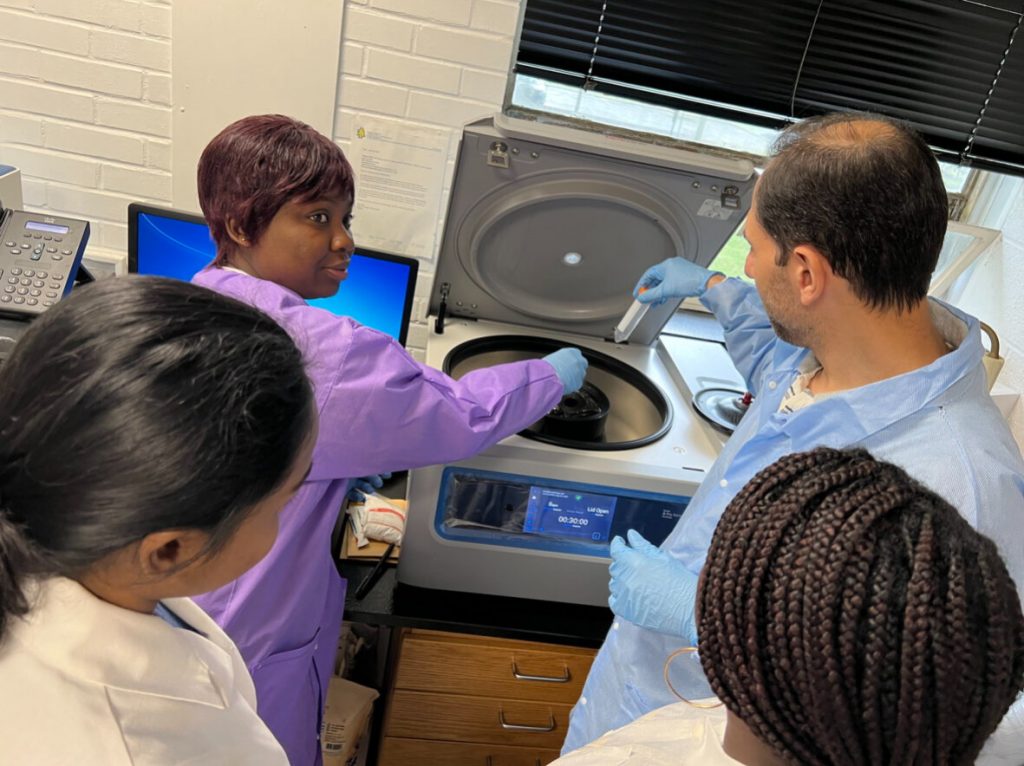
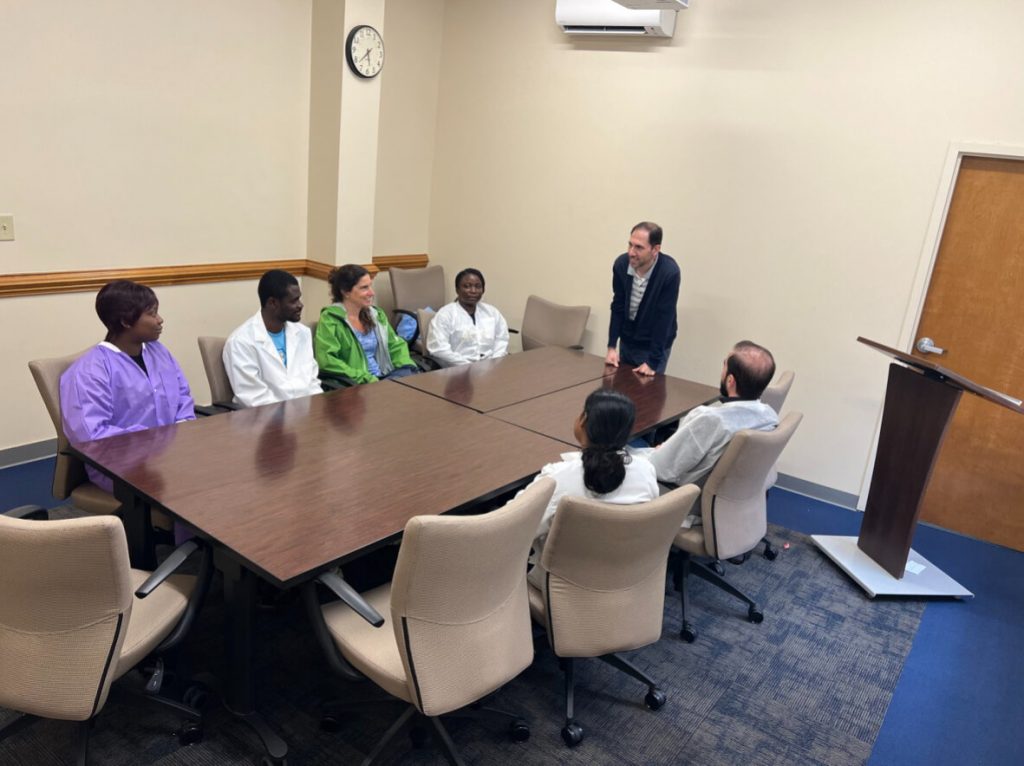
This is a very nice article that entails a lot about food microbiology and biotechnology. I am highly amazed with how some of the basic terminologies have been interlinked.
I will be glad to share this in my class page for better understanding of my program. I studies Food Processing Technology as a BSc. My humbled question is, any there a room for masters program in Food microbiology or Biotechnology.
Greetings and thank you for the interest. please send me an email and I will be very happy to discuss details with you. thanks
It was great reading this piece; I learned some things from it.
It’s fascinating to see how the Food Microbiology and Biotechnology lab uniquely blends food microbiology and biotechnology to explore the microbiological aspects of food safety, fermentation, and product development.
The lab’s outreach efforts, including partnerships with local farmers and food companies, will bridge knowledge gaps in the industry and empower students and the community. This approach will contribute to pioneer innovations in antimicrobial discovery and food preservation. This way, we will advance healthier, safer, and more sustainable food solutions.
Thank you for your valuable comments. best